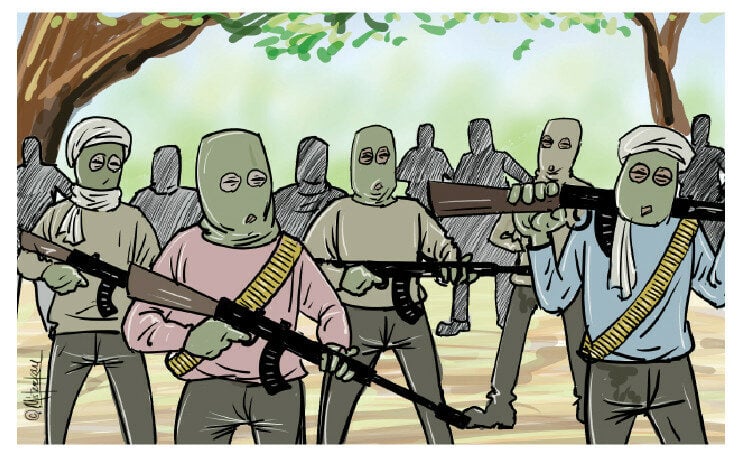Zamfara State Governor, Dauda Lawal, is hardly in the news. Lawal has enough on his plate in a region struggling with banditry and insurgency, and in a state whose political heavyweights oppose him over political differences.
He has learned to mind the state’s business, hardly ever throwing stones except when attacked by Abuja politicians who live in glass houses.
It was, therefore, a surprise last week when he released a viral video that made headlines. Following the increase in banditry in the region, especially in Zamfara and neighbouring Katsina State, which left at least 17 dead in two weeks, the governor said that, left to him, he could end the scourge in two months.
The question is, how? “I swear to Almighty Allah,” Lawal said, “Wherever a bandit leader is in Zamfara, I know. And if he goes out, I know. With my mobile phone,I can show you where these bandits are today. But we cannot do anything beyond our powers.” If only he had the power to give direct orders, the governor said, he would end banditry in Zamfara in 60 days.
Complicated reality
The reality is a little more complicated. Depending on your source, an estimated 15,000 to 20,000 people have been killed in banditry and insurgency-related fatalities in the North West alone in the last 10 years. This is on the scale of lives lost in the Kosovo War, or 40 percent of the toll in Sierra Leone’s 10-year civil war, even though non-state actors are waging banditry.
The numbers hardly reflect the suffering of thousands of children whose parents have been killed, homes without mothers or loved ones, individuals permanently injured or displaced, sources of livelihood destroyed, futures ruined, and a present lived in fear and uncertainty.
Lawal once told a story of how some bandits, whose plans were intercepted based on intelligence, managed to get away before he could get through the Byzantine chain of military command in Abuja. He is right to be frustrated by a system that reduces governors to figureheads in the face of severe security challenges, because we’re afraid that governors could abuse state police.
Sociology of banditry
Yet, it would take more than technology and decentralised policing to curtail the menace. That is what an August2025 study by the Danish Institute of International Studies suggests. The findings, which were just released, are worth considering.
The study by Peer Schouten and Barnett James, the former a senior researcher, and the latter, a PhD student at Oxford University, is entitled “Divided, They Rule? The Emerging Banditry Landscape in Northwest Nigeria.” It examines the sociology of banditry, its roots and evolution, and how it has displaced jihadists who were predominantly a Sahelian franchise in scale and impact.
The usual narrative frames bandits, jihadists, and religious extremists as “criminals and terrorists.” The study, however, takes a nuanced approach that offers an alternative view, distinguishing banditry from jihadism or other criminal franchises mainly based on ideology, geography and modes of operation.
It says, for example, that, “Unlike jihadist groups, bandit networks operate without ideological ambitions, but significantly influence rural governance, challenging state authority through both roving predation and stationary extortion.”
If it smells like banditry….
I often use the terms interchangeably. If they talk like bandits, strike like bandits, and leave behind a trail of sorrow, tears and blood, then, for me, they are bandits, jihadists, criminals and terrorists. The point of the study, however, is that without establishing motive and methodology, response and policy could miss the mark.
To speak Lawalese, the Zamfara State governor or any governor in Nigeria’s North West, who is interested in tackling insecurity, might need more than executive authority to succeed. They would need, in addition to state police (which I support fully), to understand the social psychology of the enemy they’re dealing with. Otherwise, we might be worse off in two times twenty months or whatever time Lawal might need.
This study shares how, through a pattern of “roving predation and stationary extortion,” bandits have, since 2011, created a system of governance “that echoes, in significant ways, precolonial patterns of rule and extraction in the region.”
Echoes of the Caliphate
In plain language, the study says that banditry, which has evolved over the last nearly 15 years, especially, is reproducing a distinct feature of the Caliphate system in Northern Nigeria, which, among other things, depended heavily on “raiding and tribute-taking” for its expansion and sustenance.
“Today’s banditry,” the study says, “reproduces these patterns, with modern motorcycles and mobile phones replacing the horses and single-shot muskets of the 19thcentury. While the tools have changed, the underlying dynamics of rule and accumulation remain strikingly familiar to the affected rural communities.”
The research does not assume that the bandits are all Fulanis, as was the case mainly in the 18th and 19thcenturies. Or that they harbour the state-building aspiration or religious zeal of the jihadists of the time. It, however, observes recurrent patterns of authority and legitimacy in these regions similar to the Caliphate model.
Hydra-headed monster
Lawal agonised about missing a prime bandit target because of command bureaucracy. The military, on its part, has also targeted prominent bandit leaders, the most recent successes being Baleri Fakai and Halilu Buzu.
These were significant strides in the battle against banditry. This study, however, likens the bandit network to a hydra-headed monster. It’s a loose confederacy that adapts and replicates itself even after removing the current leader. They are designed to survive the loss of their leaders, whose elimination is sometimes unwelcome by the host community.
Why? Last year, when Halilu Sububu was killed, for example, one source told the researchers that, “It was an error to kill Buzu (Halilu). He started doing good things, telling bandits to stop harassing the Fulani. He had a positive influence in Zamfara, Kaduna, Katsina, Kebbi and Sokoto.”
In other words, in a strange mutational trajectory, bandits are transforming from “criminals and terrorists” to “carers,” filling the void of absentee governments. Call it the Stockholm Syndrome, if you like, but those who wondered why bandit-in-chief Kachalla Ado Aliero was crowned Sarkin Fulani in Zamfara in 2022 need not wonder anymore.
And those rightly outraged by the foolishness of making peace deals with bandits instead of bombing them to dust might wish to pause. As they say in South West Nigeria, when the leaf has wrapped the soap bar for too long, they become indistinguishable.
Quoting an instance in a pathetic case, the study says, “In 2024, kachalla Najaja’s men (bandits) punished Anka town (in Zamfara) for harbouring vigilantes by preventing its residents from harvesting millet, using starvation as a tool to force submission. Desperate villagers ultimately negotiated ‘peace’ by paying N50 million. One negotiator reflected, ‘Our local ruler forbade us to negotiate, but he could not offer us protection nor guarantee us food.’”
Loot big, die poor
What do the bandits do with the money? They store their “wealth,” mainly from tributes, ransom cash, and rustled cattle, in fungible forms, which they use to purchase more cattle, but especially to buy more arms, a significant status symbol. Like the slave-holding elite of precolonial Africa, the prestige of bandit leaders is sometimes measured in their retinue of fighters, abductees or dependents. They make no pretence to egalitarianism. The leader enjoys a chunk of the loot.
Yet, despite their legendary fame, a Kebbi hunter tells the researchers, “They have few worldly possessions” and die poor.
The study concludes that banditry happens in the absence of sustained commitment to rural development, the creation of economic opportunity, and institutional reform. It’s thought-worthy for any government interested in a long-term solution.





